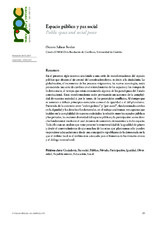Mostrar el registro sencillo del ítem
Espacio público y paz social
| dc.contributor.author | Salazar Benítez, Octavio | |
| dc.date.accessioned | 2012-08-27T10:43:13Z | |
| dc.date.available | 2012-08-27T10:43:13Z | |
| dc.date.issued | 2010 | |
| dc.identifier.uri | http://hdl.handle.net/10396/7720 | |
| dc.description.abstract | En el presente siglo estamos asistiendo a una serie de transformaciones del espacio público que afectan al eje central del constitucionalismo, es decir, a la ciudadanía. La globalización, el incremento de los procesos migratorios, las nuevas tecnologías, están provocando una serie de cambios en el entendimiento de los espacios y los tiempos de la democracia, al tiempo que están erosionando algunos de los paradigmas del Estado constitucional. Estas transformaciones están provocando un aumento de la complejidad de nuestras sociedad y, por lo tanto, de los potenciales conflictos. Al tiempo que se someten a debate principios esenciales como el de igualdad o el del pluralismo. Partiendo de la conexión entre “orden político” y “paz social”, fundamentados ambos en la dignidad y los derechos fundamentales, en el trabajo analizamos tres aspectos que inciden en la complejidad de nuestras sociedades: la relación entre los espacios públicos y los privados, la creciente diversidad del espacio público y la participación como derecho fundamental mediante el cual dotamos de contenido democrático a dicho espacio. Todo ello con un análisis que tiene presente la transversalidad de la igualdad de género y desde el convencimiento de que muchos de los retos que planteamos sólo pueden responderse adecuadamente desde una concepción republicana de la democracia en la que el ámbito local es el ámbito más adecuado para el fomento de las virtudes cívicas y el diálogo intercultural. | es_ES |
| dc.description.abstract | In the present century we are present at a series of transformations of the public space that they affect to the backbone of the constitutionalism, that is to say, to the citizenship. The globalization, the increase of the migratory processes, the new technologies, are provoking a series of changes in the understanding of the spaces and the times of the democracy, at the time that they are eroding some of the paradigms of the constitutional State. These transformations are provoking an increase of the complexity of our society and, therefore, of the potential conflicts. At the time that essential beginning(principles) surrenders to debate as that of equality or that of the pluralism. Departing from the connection between “ political order “ and “ social peace “, based both in the dignity and the fundamental rights, in the work we analyze three aspects that affect in the complexity of our societies: the relation between the public spaces and the private ones, the increasing diversity of the public space and the participation like fundamental right by means of which we provide with democratic content to the above mentioned space. All this with one analysis that has is presented by the mainstreaming of the equality of genre and from the conviction of which many of the challenges that we raise only can be answered adequately from a republican conception of the democracy in which the local area is the better space for the promotion of the civic virtues and the intercultural dialogue. | es_ES |
| dc.format.mimetype | application/pdf | es_ES |
| dc.language.iso | spa | es_ES |
| dc.publisher | Instituto de la Paz y los Conflictos | es_ES |
| dc.rights | https://creativecommons.org/licenses/by-nc-nd/4.0/ | es_ES |
| dc.source | Revista Paz y Conflictos 3, 23-43 (2010) | es_ES |
| dc.subject | Ciudadanía | es_ES |
| dc.subject | Paz social | es_ES |
| dc.subject | Participación | es_ES |
| dc.subject | Igualdad | es_ES |
| dc.subject | Diversidad | es_ES |
| dc.subject | Republicanismo | es_ES |
| dc.subject | Citizenship | es_ES |
| dc.subject | Social peace | es_ES |
| dc.subject | Participation | es_ES |
| dc.subject | Equality | es_ES |
| dc.subject | Diversity | es_ES |
| dc.title | Espacio público y paz social | es_ES |
| dc.title.alternative | Public space and social pace | es_ES |
| dc.type | info:eu-repo/semantics/article | es_ES |
| dc.rights.accessRights | info:eu-repo/semantics/openAccess | es_ES |

